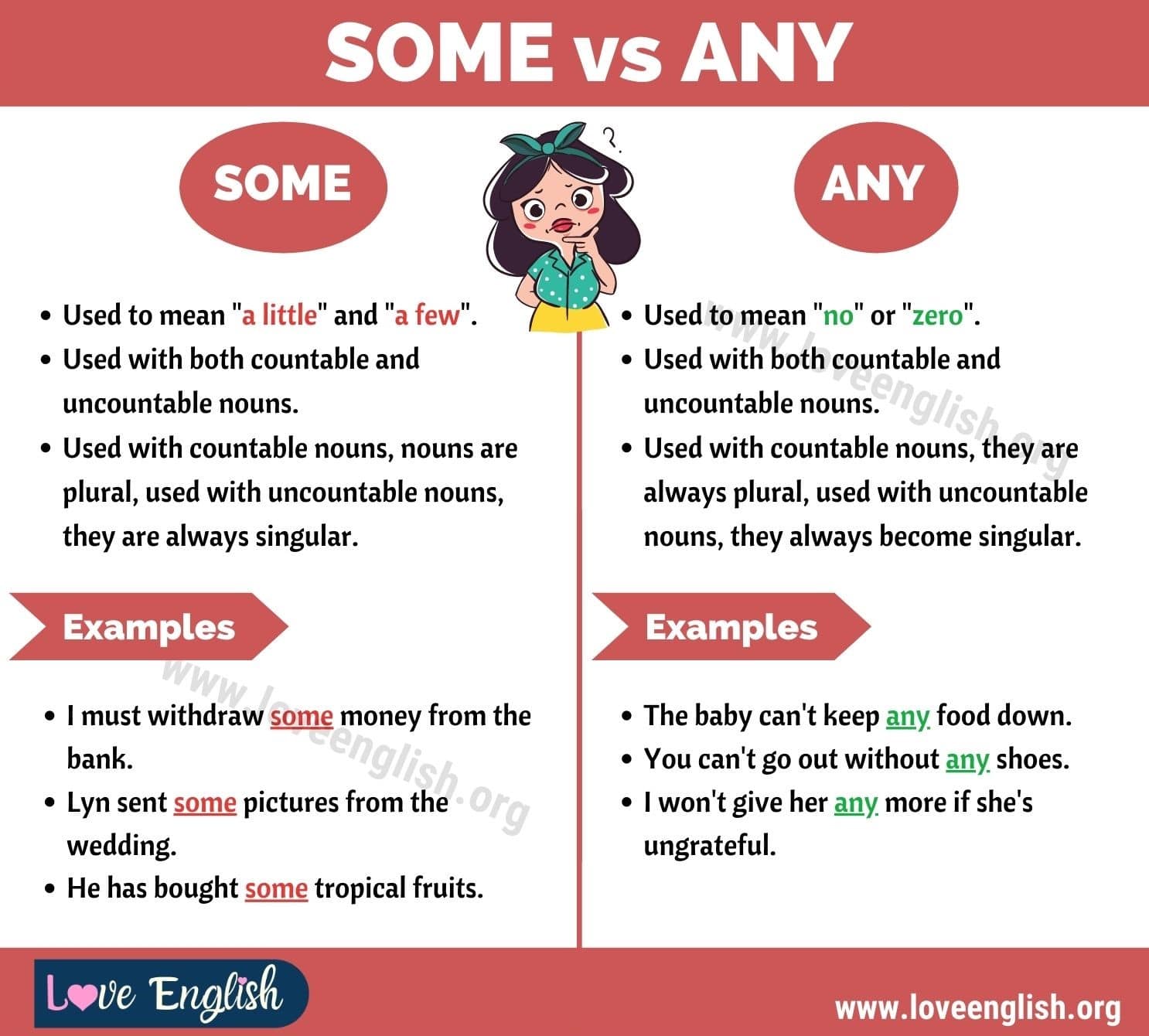
Some Vs. Any How To Use Some And Any In Sentences Love English
Learn the Difference Between 'Some' and 'Any' in Less Than a Minute Ann Edwards Updated on January 14, 2021 Grammar Some typically implies a specific type or form. For example: I bought some candles. Some of my Facebook friends live in San Diego. Some is only used in a question when an offer is being made, or there is a request for something.

What’s the Difference Any and Some Materials For Learning English
The first thing you need to know is that we use 'some' and 'any' before plural and uncountable nouns. And we do it to talk about a certain number or amount of something when we don't actually know exactly how much or how many of that thing we want. I need to buy some bread. I'm saying that I need to buy an amount of bread but I'm.

Some vs Any in English English Study Here
some The award-winning grammar and spell checker that corrects all types of English grammar and spelling mistakes. Start proofreading your texts now.

Местоимения some и any в английском языке. Основы грамматики
We don't form the plural with -s or -es. some women some womans. three children three childs. Countable nouns are things and people that we can count. I've got an apple and two bananas. There are twelve students in my class. We use a/an with singular countable nouns. I've got an orange and a banana.

SOME vs ANY How to Use Some and Any in Sentences Love English
from English Grammar Today We use some and any in different types of clauses. To top Contents Some and any - English Grammar Today - a reference to written and spoken English grammar and usage - Cambridge Dictionary

SOME vs ANY How to Use Some and Any in Sentences ESL Teachers
Some vs. Any - The Blue Book of Grammar and Punctuation Some vs. Any Any and some can be synonymous; that is, they may have the same meaning. Both may be used in affirmative or negative questions: Examples: Will you have any? Will you have some? Won't you have any? Won't you have some?
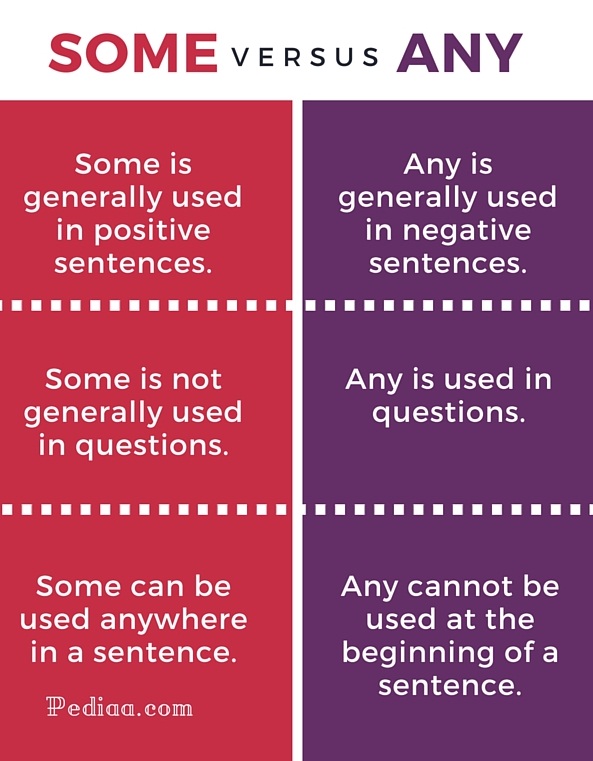
Difference Between Some and Any
Average: 4.3 (649 votes) Wed, 11/12/2008 - 00:25 — Chris McCarthy Confusing Words Vocabulary 'I bought some bread' or 'I bought any bread'? Some Countable and uncountable Some is used with both countable and uncountable nouns: Countable Nouns - 'Some people in my school like Jazz.' Uncountable Nouns - 'There was some snow here last winter.'

The Differences Between SOME and ANY Learn english, English grammar
In addition, "some" can be used to express a positive opinion or feeling. For example, "That was some game!" expresses enthusiasm and excitement. It is important to note that "some" is not used in negative contexts. Instead, "any" is used. For example, "I don't have any money" is correct, while "I don't have some money.

Any vs some Englisch lernen, Sprachen lernen, Sprache
Woodward English 926K subscribers Join Subscribe Subscribed 7.6K Share 491K views 6 years ago Learn English Grammar - Improve your English with these grammar rules The difference between SOME and.

"ANY vs. SOME" englishtips english English tips, Sentences, English
Any: How to Use 'SOME' & 'ANY' in English In this post, you're going to learn how to avoid common mistakes when using ' any ' in English. You'll also learn the difference between ' some ' and ' any '. Teaching English Just Got Easier!

Quelle est la différence entre some et any ?? Leaenglish
The difference between some and any: Generally, we use any in the same way as some: when we are thinking about a certain amount or number of something.
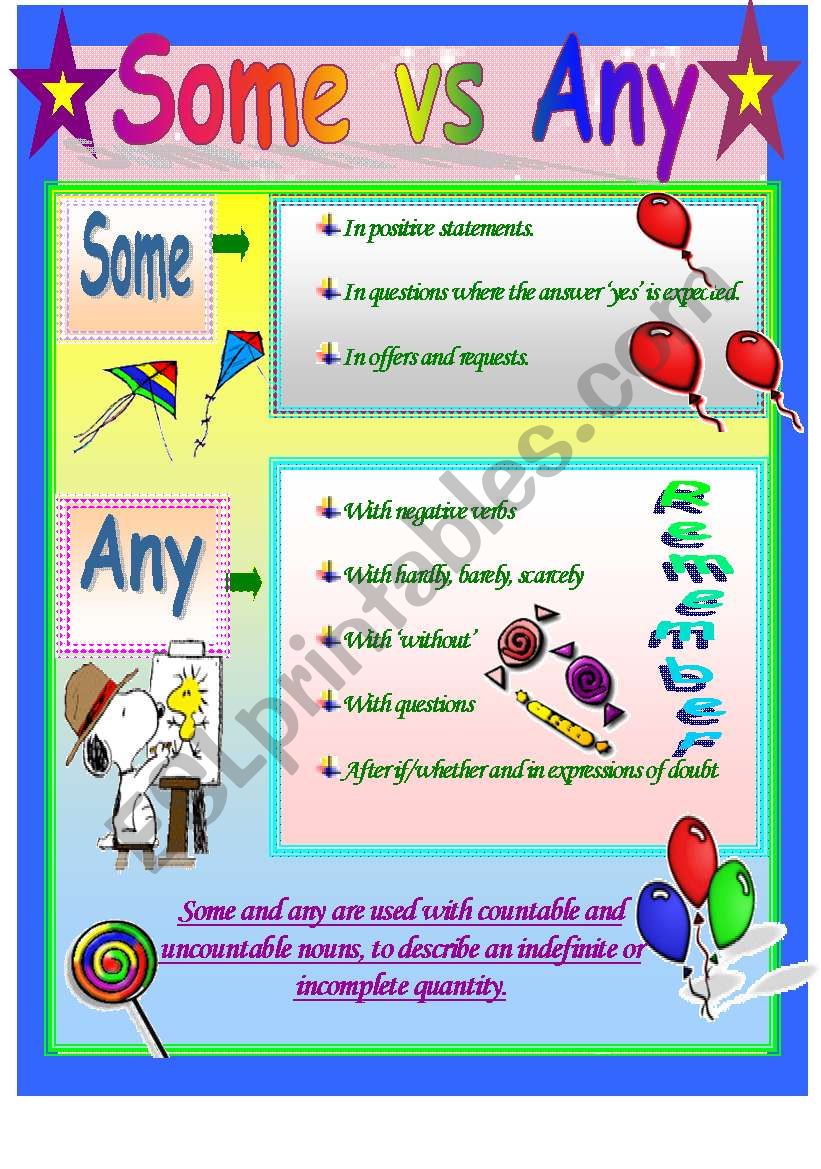
Some vs Any ESL worksheet by demmieb
Uncountable nouns have no plural form. We don't add -s. some bread some breads. We don't use a / an with uncountable nouns. some milk a milk. We use some with uncountable nouns in positive sentences. I've got some bread. There's some chicken. We use any with uncountable nouns in negative sentences and in most questions.
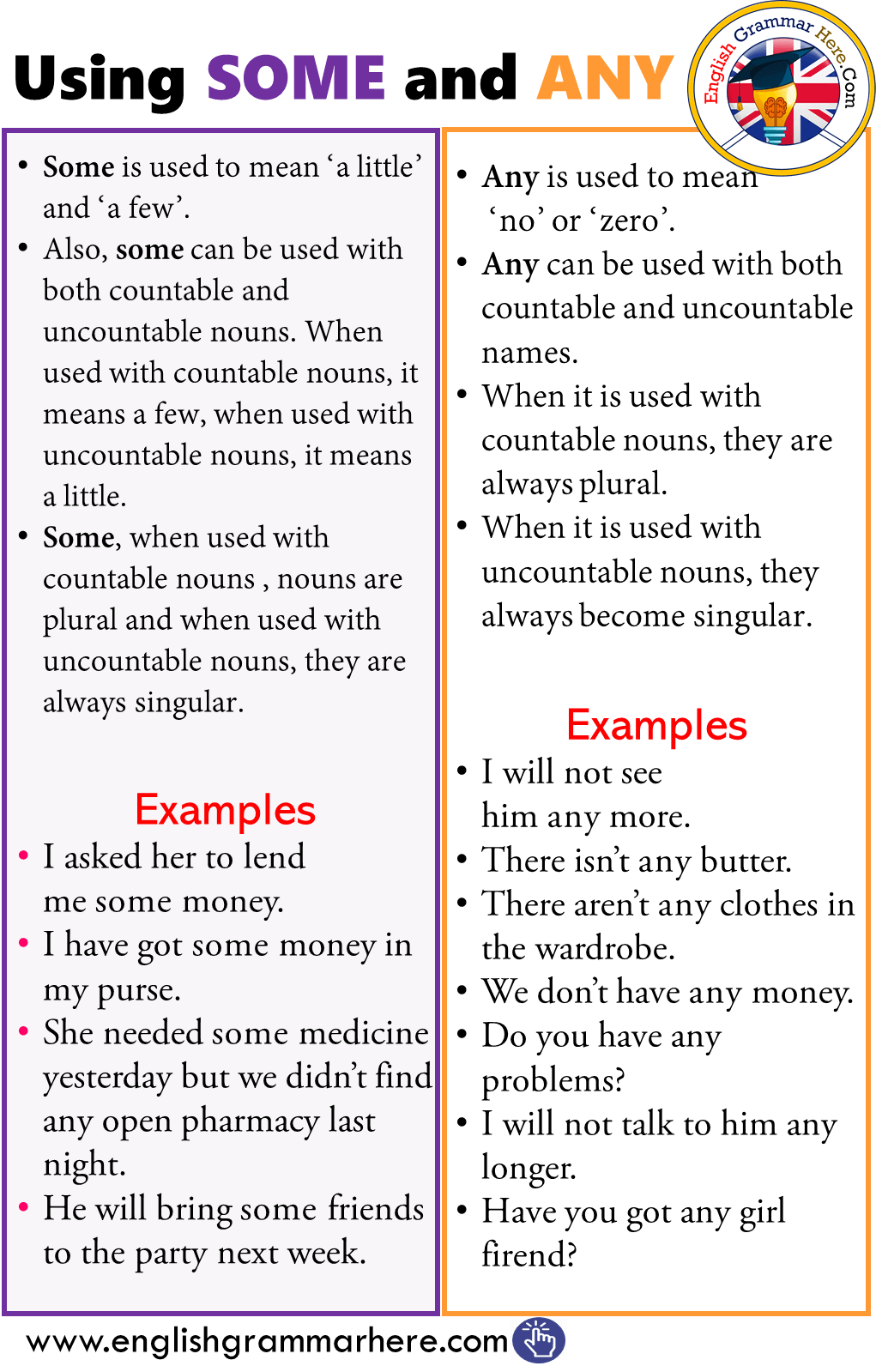
Using SOME and ANY in English English Grammar Here
Someone, Somebody, Anyone, Anybody, Something, Anything. We can add the suffixes (endings) -thing, -one, -body, and-where to some and any to create indefinite pronouns.These allow us to refer to people (someone/somebody, anyone/anybody), places (somewhere, anywhere) and objects, ideas and concepts (something, anything).. We use these words in the same way as some and any; words starting with.

Using SOME and ANY in English English Study Page
September 8, 2015 -. The words some and any are determiners. They are used to modify nouns. Some and any can be used with both countable and uncountable nouns. They show an indefinite quantity or number. There are some mangoes on the tree. (We don't mention the exact number of mangoes on the tree.) I haven't got any money.
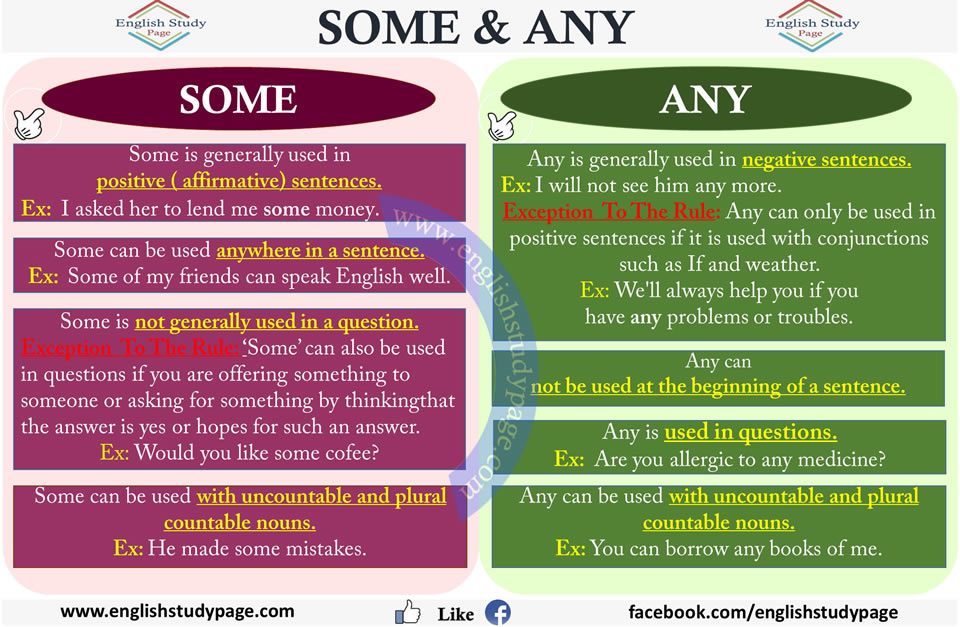
Using SOME and ANY in English English Study Page
Definition of Some Some is a quantifier, which refers to the amount, number or part of a particular entity which is not specified. As a determiner, some can be used prior to the nouns to signify the indefinite quantities. However, the quantity is irrelevant; when we use some, it means a limited quantity.
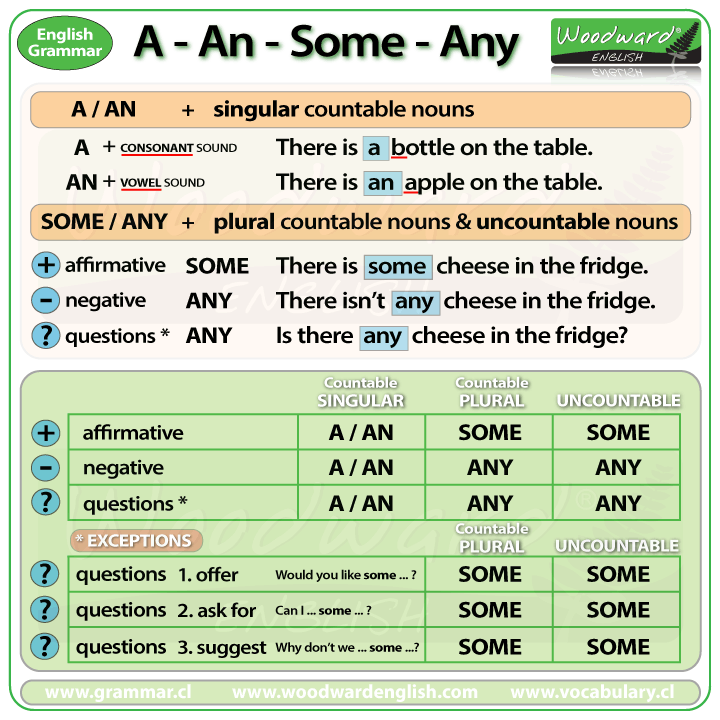
Some and Any in English Grammar rules and example sentences
Free English grammar exercise. In this grammar exercise, we will be focusing on the correct usage of the words 'some' and 'any'. These two words are commonly used in English to indicate the presence or absence of a quantity or amount. However, it is important to understand the differences in their meanings and when to use each one appropriately.